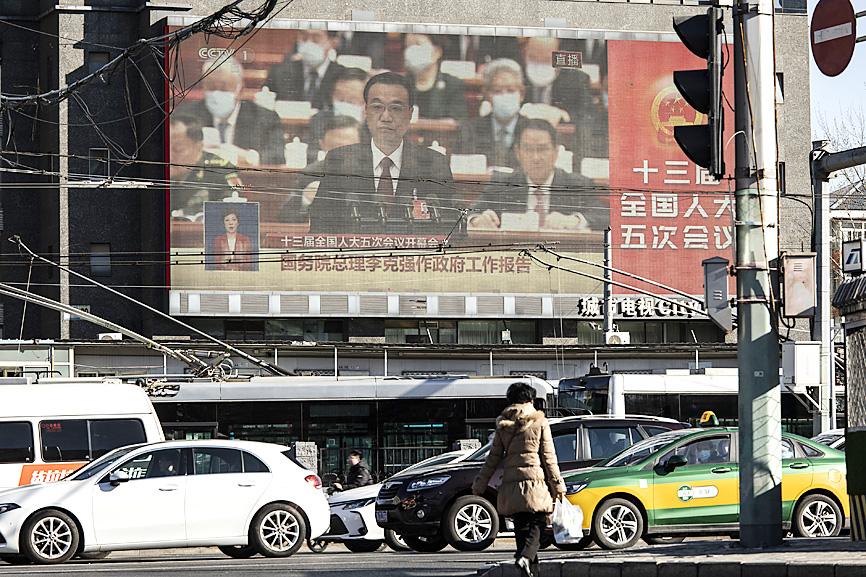Beijing’s comments and policies regarding Taiwan are and always have been “self-intoxicating propaganda that Taiwanese reject,” the Mainland Affairs Council (MAC) said yesterday, shortly after Chinese Premier Li Keqiang (李克強) said that Beijing stands by the “one China” principle and the so-called “1992 consensus.”
Speaking at the opening of the annual Chinese National People’s Congress, Li said: “We firmly oppose any separatist activities seeking ‘Taiwan independence’ and firmly oppose foreign interference.”
“All of us, Chinese on both sides of the Taiwan Strait, should come together to advance the great and glorious cause of China’s rejuvenation,” he said. “We will advance the peaceful growth of relations across the Taiwan Strait and the reunification of China.”

Photo: Bloomberg
The MAC said that the Chinese Communist Party’s (CCP) “one China” principle runs contrary to “historical facts and the present reality.”
Any activity undertaken with the aim of denying the sovereignty of Taiwan or its participation in the global community would be a breach of international law, world peace and the wishes of Taiwanese, it said.
China would do well to refrain from using military force, making threats and other unacceptable behavior, it said.
China has increased its military activity near Taiwan over the past two years, and yesterday announced that it was raising its defense spending 7.1 percent to US$229 billion this year.
China has the world’s second-largest defense budget after the US, enabling it to maintain the largest standing military, with 3 million personnel and an arsenal of advanced weaponry, including two aircraft carriers with more on the way, stealth fighters, an advanced missile force and nuclear-powered submarines.
This year’s increase exceeds the 6.8 percent boost from last year, showing China’s determination to maintain the drive to expand and modernize its armed forces despite high levels of government debt and a slowing economy, partly as a result of the COVID-19 pandemic.
By contrast, the US this year increased its defense spending by about 2 percent to US$768.2 billion.
The Chinese government said that most of the spending increases would go toward improving troops’ welfare.
The budget omits much of China’s spending on weaponry, most of which is developed domestically, observers said.
Li said China would “fully implement [Chinese President] Xi Jinping’s (習近平) thinking on strengthening the armed forces and the military strategy for the new era ... and strengthen party leadership and party building in all aspects of the military.”
Kuo Yu-jen (郭育仁), a security expert at Taiwan’s National Sun Yat-sen University’s Institute of China and Asia-Pacific Studies, said that Beijing was being forced to spend more on research and development in light of the US-China technology dispute.
“Costs for China’s third and fourth aircraft carriers are going up, too,” he added.
The “1992 consensus” — a term former MAC chairman Su Chi (蘇起) in 2006 admitted making up in 2000 — refers to a supposed tacit understanding between the Chinese Nationalist Party (KMT) and the CCP that both sides of the Taiwan Strait acknowledge that there is “one China,” with each side having its own interpretation of what “China” means.
The DPP says the “1992 consensus” does not exist.

EUROPEAN TARGETS: The planned Munich center would support TSMC’s European customers to design high-performance, energy-efficient chips, an executive said Taiwan Semiconductor Manufacturing Co (TSMC, 台積電), the world’s largest contract chipmaker, yesterday said that it plans to launch a new research-and-development (R&D) center in Munich, Germany, next quarter to assist customers with chip design. TSMC Europe president Paul de Bot made the announcement during a technology symposium in Amsterdam on Tuesday, the chipmaker said. The new Munich center would be the firm’s first chip designing center in Europe, it said. The chipmaker has set up a major R&D center at its base of operations in Hsinchu and plans to create a new one in the US to provide services for major US customers,

The Ministry of Transportation and Communications yesterday said that it would redesign the written portion of the driver’s license exam to make it more rigorous. “We hope that the exam can assess drivers’ understanding of traffic rules, particularly those who take the driver’s license test for the first time. In the past, drivers only needed to cram a book of test questions to pass the written exam,” Minister of Transportation and Communications Chen Shih-kai (陳世凱) told a news conference at the Taoyuan Motor Vehicle Office. “In the future, they would not be able to pass the test unless they study traffic regulations

GAINING STEAM: The scheme initially failed to gather much attention, with only 188 cards issued in its first year, but gained popularity amid the COVID-19 pandemic Applications for the Employment Gold Card have increased in the past few years, with the card having been issued to a total of 13,191 people from 101 countries since its introduction in 2018, the National Development Council (NDC) said yesterday. Those who have received the card have included celebrities, such as former NBA star Dwight Howard and Australian-South Korean cheerleader Dahye Lee, the NDC said. The four-in-one Employment Gold Card combines a work permit, resident visa, Alien Resident Certificate (ARC) and re-entry permit. It was first introduced in February 2018 through the Act Governing Recruitment and Employment of Foreign Professionals (外國專業人才延攬及雇用法),

‘A SURVIVAL QUESTION’: US officials have been urging the opposition KMT and TPP not to block defense spending, especially the special defense budget, an official said The US plans to ramp up weapons sales to Taiwan to a level exceeding US President Donald Trump’s first term as part of an effort to deter China as it intensifies military pressure on the nation, two US officials said on condition of anonymity. If US arms sales do accelerate, it could ease worries about the extent of Trump’s commitment to Taiwan. It would also add new friction to the tense US-China relationship. The officials said they expect US approvals for weapons sales to Taiwan over the next four years to surpass those in Trump’s first term, with one of them saying